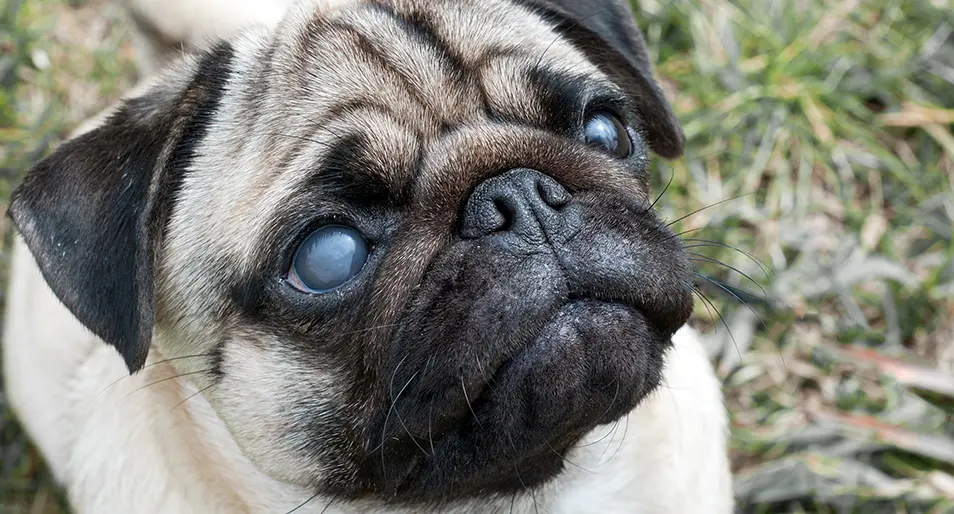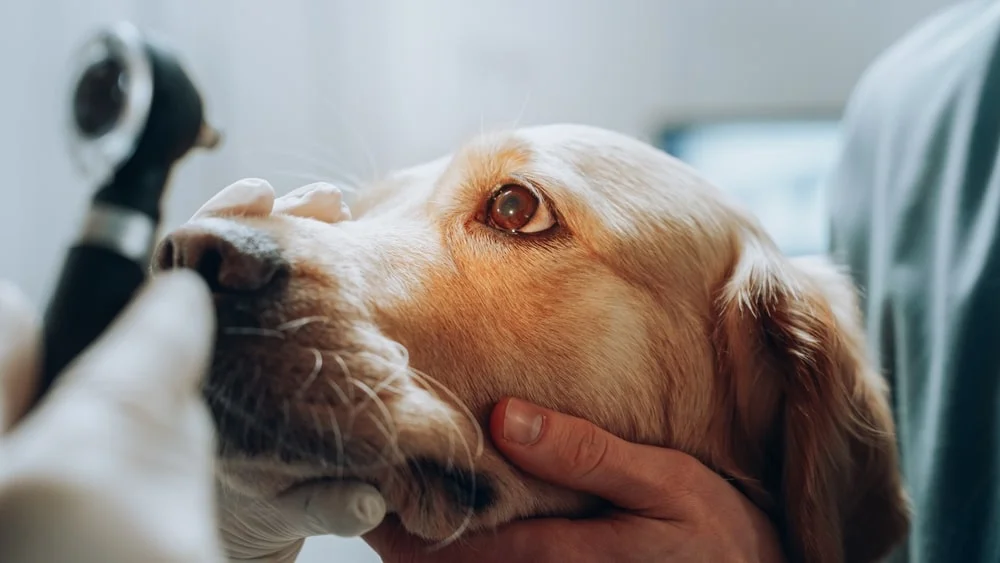PET HEALTH
How Much Does Dog Cataract Surgery Cost? Vet-Reviewed Insights
None of us like to think about our dogs aging, but it’s a fact we all must face. One symptom of aging is vision deterioration. While mild vision loss is normal and shouldn’t be cause for concern, cataracts are another story. They can cause your dog pain and, if left untreated, could lead to total blindness. But can dogs have cataract surgery? Absolutely.
Read on to learn everything you need to know about cataract treatment for dogs. We’ll break down the causes, the cost of the surgery, what cataract surgery entails, and recovery time.
MetLife Pet Insurance can help reimburse1 vet bills for cataract surgery.
MetLife Pet Can Help Cover Cataract Surgery Costs
How Much Is Cataract Surgery for Dogs?
The cost for dog cataract surgery can be between $2,700 and $4,000, with an average cost of around $3,500. This is one of the more expensive procedures your dog might require.2 The cost of surgery includes:3
- Examinations
- Diagnostics
- Anesthesia
- Surgery
- Post-operative monitoring
- Hospitalization
What Are Cataracts?
Cataracts in dogs are when the lens of their eye becomes cloudy or opaque.3 Cataracts affect dogs and humans in much the same way. You can recognize them by an opaqueness or the development of spots in the eye. Degradation of proteins in the lens blocks light from reaching the back of the eye and causes vision to become blurry.2,3 Cataracts typically happen as the eye ages, but genetic disorders, trauma, or diabetes can also cause them.3
The symptoms of cataracts can worsen as time progresses.4 Untreated cataracts can cause inflammation in the eye, leading to significant pain.3 Cataracts that cover a small portion of the eye don't usually cause significant vision loss. However, as the cataracts spread, your dog may become visually impaired, and complete coverage of the lens will result in blindness in the affected eye.4
What Causes Cataracts in Dogs?
Several factors can cause cataracts in your dog. It’s important to know your dog’s potential risks and stay on top of any pre-existing conditions. Some common causes can include:3,4
- Genetics
- Age
- Diabetes
- Disease
- Trauma
- Nutritional imbalance
Which Dog Breeds Are at Risk of Cataracts?
Dogs of all breeds, genders, and ages can develop cataracts. However, some breeds are more susceptible to the condition than others.4,5
Here are some breeds that are more genetically predisposed to cataract formation:4,5
- Poodles
- Miniature schnauzers
- Boston terriers
- American cocker spaniels
- Bichon frisés
- Havanese
- Labrador retrievers
- Siberian huskies
- French bulldog
- Australian shepherds
If your pooch belongs to one of these breeds, be sure to bring them to your veterinarian for regular checkups. Your vet can screen for early signs of cataract development. It’s also a good idea to consider a dog insurance policy while they’re healthy. That way, cataracts developed later in life won’t be excluded from coverage.
What Are the Symptoms of Cataracts in Dogs?
Symptoms of cataracts can include:6
- Cloudy eyes
- Rubbing or scratching at the eyes
- Changes in eye color
- Changes in pupil size or shape
- Signs of vision impairment
- Watery eyes
If you recognize any of these symptoms in your dog, bring them to the vet for an examination. They may refer you to a veterinary ophthalmologist — an eye specialist — for a full diagnosis.
What Do You Need To Know About Dog Cataract Surgery?
Before cataract surgery, your vet will perform preoperative scans to test the retina function and make sure there’s no lens rupture or retinal detachment.2,3 If your dog’s retina and lens look otherwise healthy, they’re a good candidate for the surgery.2
Removing cataracts works the same for dogs as it does for humans. After the initial exam, the veterinary surgeon will put your pooch under general anesthesia. The surgeon will then apply ultrasonic waves to the affected lens. This technique, known as phacoemulsification, emulsifies the cataract and makes it easier to remove. The surgeon then removes the lens and replaces it with an artificial one, called an intraocular lens.2,3
As with any surgery, there are potential complications, such as retinal detachment, infection, or glaucoma.3
Cataract surgery for dogs has a long-term success rate of 85% – 90%.7 That means most dogs regain their vision and experience normal intraocular pressure for at least a year after surgery.
How Can You Help Your Dog Recover From Cataract Surgery?
Often, the vet will recommend your dog stay overnight for monitoring. Once they’re released from the animal hospital, they’ll need time to recover at home.2
Following surgery, your dog must wear a protective collar until their eye heals. You’ll also have to give them eye drops to mitigate irritation several times per day.3 The recovery process usually takes 10 – 14 days.7
While your dog’s vision should return the day after surgery, it can take weeks for it to fully settle.2 Have patience with your dog, help guide them as they get used to the new lens, and give them lots of love and encouragement. After all, recovering from surgery is hard work.
Can Cataracts Be Removed From Dogs Without Surgery?
Dog cataract surgery is the only certain way to treat cataracts.3 Some products, such as Lanosterol eye drops, claim to reduce or even cure cataracts in dogs. While cheaper than surgery, eye drops are new and still in clinical studies.8 If you’re considering trying one of these products, consult your vet first.
MetLife Pet Insurance May Help Cover Cataract Costs
If your dog has cataracts, surgery is likely their best chance at regaining their vision and treating any pain they might be suffering.3 Likewise, a pet insurance policy can help you save. Our MetLife Pet Insurance members understand the importance of this firsthand.
For example, when Cooper — a mixed-breed dog from Arizona — showed signs of visual impairment, his pet parents took him to the vet for a cataract exam, resulting in a bill of over $1,600. Luckily, his parents had a MetLife Pet policy that reimbursed them over $1,100.9 And when Milo — a mixed breed pup from South Carolina — needed prescription medication after his cataract surgery, his pet parents saved 90% off of the cost with their MetLife Pet policy.10
Find out why a pet insurance policy may be worth it, and how it could protect your pup while also saving you money. Then, fetch a free quote from MetLife Pet Insurance to get started.
Help Protect Your Dog at Any Age
855-270-7387
Dr. Hunter Finn is an integrative veterinary expert first, and social media star second. America’s favorite veterinarian owns Pet Method in McKinney, Texas, where he cares for pets while prioritizing their emotional well-being. When he’s not at his clinic, he’s starring in viral videos on TikTok (2 million followers) and Instagram (500K followers) — where he’s been known to snuggle puppies and conquer the latest dance trends.




